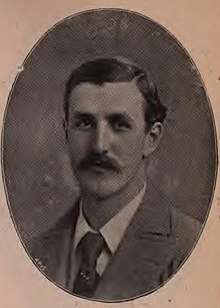Jacob Pleydell-Bouverie, 6th Earl of Radnor
Jacob Pleydell-Bouverie, 6th Earl of Radnor, CIE, CBE (8 July 1868 – 26 June 1930),[1] styled Viscount Folkestone from 1889 to 1900, was a British Conservative Party politician and a British Army officer.
The Earl of Radnor CIE CBE | |
|---|---|
 Viscount Folkestone in 1895 | |
| Member of Parliament for Wilton | |
| In office 16 July 1892 – 3 June 1900 | |
| Preceded by | Sir Thomas Grove |
| Succeeded by | James Morrison |
| Personal details | |
| Born | 8 July 1868 |
| Died | 26 June 1930 (aged 61) |
| Political party | Conservative |
| Spouse(s) | Julian Eleanor Adelaide Balfour
( m. 1891) |
| Children | 10, including William Pleydell-Bouverie, 7th Earl of Radnor |
Early life
Pleydell-Bouverie was the son of William Pleydell-Bouverie, 5th Earl of Radnor and Helen Matilda Chaplin.[2] He was educated at Harrow School and Trinity College, Cambridge.[3]
Career
After two years' service as assistant private secretary to the right Hon. Henry Chaplin, from 1890 to 1892,[2] he was elected to the House of Commons at the 1892 general election as Member of Parliament for the Wilton division of Wiltshire, and held the seat until he succeeded to the peerage in 1900.[4] In November 1901 he was elected Mayor of Folkestone for the following year,[5] and when he vacated the office the following year he donated a sum equal to the salary to the Victoria Hospital.[6] During his year as Mayor, he received the German Emperor Wilhelm II on his visit to Shorncliffe to inspect a cavalry regiment in November 1902.[7]
Beyond political life, he was an officer in the 4th (Volunteer) Battalion, the Wiltshire Regiment. He saw active service in South Africa in 1900 when he volunteered to serve in a company attached to a regular battalion during the Second Boer War. Leaving Southampton for Cape Town in February 1900,[8] he returned later the same year as he succeeded to the title on the death of his father. He was promoted to the rank of lieutenant-colonel and brevet colonel commanding the 4th Battalion, and later served in India from 1914 to 1917, where he was Brigadier-General of the Dehra Dun Brigade. In 1918 he was Director of Agricultural Production for the British Expeditionary Force.[2]
He also chaired a Royal Commission on the Care and Control of the Feeble-Minded, between 1904 and 1908.[2] On 27 June 1919, he was appointed a deputy lieutenant of Wiltshire.[9]
Lord Radnor served as Governor of the French Hospital. Successive Earls of Radnor were governors of the hospital from the eighteenth century to 2015.[10]
Family
Before inheriting the earldom, Pleydell-Bouverie married Julian Eleanor Adelaide Balfour, daughter of Charles Balfour, on 20 January 1891, and they had ten children:
- Lady Jeane Pleydell-Bouverie (23 March 1892 – 1976), married Maj. (George) Gerald Petherick (d. 1946) in 1914 and had issue.
- Lady Katherine Pleydell-Bouverie (16 May 1894 – 12 November 1961), married John Henry McNeile.
- William Pleydell-Bouverie, 7th Earl of Radnor (1895–1968)
- Lady Elizabeth Pleydell-Bouverie (27 June 1897 – 1982)
- Capt. Hon. Edward Pleydell-Bouverie (10 September 1899 – 7 May 1951), married Alice Pearl Crake, widow of 2nd Baron Montagu of Beaulieu, and had issue.
- Maj. Hon. Bartholemew Pleydell-Bouverie (6 April 1902 - 31 October 1965), married firstly Lady Doreen Clare Hely-Hutchinson, daughter of the 6th Earl of Donoughmore, and had issue and secondly with Katherine Tod.
- Lady Margaret Pleydell-Bouverie (26 June 1903 – 17 September 2002), married Lt.-Col Gerald Barry and had issue.
- Hon. Anthony Pleydell-Bouverie (26 March 1905 – 25 June 1961), married Anita Estelle Costiander.
- Lady Helen Pleydell-Bouverie, OBE (2 January 1908 – 2003), married on 22 July 1931 Lt.-Col Hon. David John Smith, son of the 2nd Viscount Hambleden, and had issue.
- Hon. Peter Pleydell-Bouverie (19 October 1909 – 1981), married firstly Audrey Evelyn James and secondly Audrey Kidston and had issue by the latter.
References
- "House of Commons constituencies beginning with "W" (part 4)". Leigh Rayment's House of Commons pages. Archived from the original on 11 October 2017. Retrieved 18 April 2009.
- 'RADNOR, 6th Earl of', in Who Was Who 1929–1940, (1967 reprint ISBN 0-7136-0171-X)
- "Bouverie or Pleydell-Bouverie, the Hon. Jacob (BVRY886J)". A Cambridge Alumni Database. University of Cambridge.
- Craig, F. W. S. (1989) [1974]. British parliamentary election results 1885–1918 (2nd ed.). Chichester: Parliamentary Research Services. p. 418. ISBN 0-900178-27-2.
- "Election of Mayors". The Times (36609). London. 11 November 1901. p. 7.
- "Court Circular". The Times (36911). London. 29 October 1902. p. 8.
- "The German Emperor′s visit - Inspection of the 1st (Royal) Dragoons". The Times (36921). London. 10 November 1902. p. 8.
- "The War - Embarcation of Troops". The Times (36069). London. 19 February 1900. p. 12.
- "No. 31433". The London Gazette. 4 July 1919. p. 8391.
- Tessa Murdoch and Randolph Vigne with foreword by Jacob Pleydell-Bouverie, 8th Earl of Radnor, The French Hospital in England: Its Huguenot History and Collections Cambridge: John Adamson ISBN 978-0-9524322-7-2 OCLC 318092110.
External links
- Hansard 1803–2005: contributions in Parliament by the Earl of Radnor
| Parliament of the United Kingdom | ||
|---|---|---|
| Preceded by Sir Thomas Grove |
Member of Parliament for Wilton 1892 – 1900 |
Succeeded by James Archibald Morrison |
| Honorary titles | ||
| Preceded by The Viscount Long |
Lord Lieutenant of Wiltshire 1925–1930 |
Succeeded by Sir Ernest Wills, Bt |
| Peerage of Great Britain | ||
| Preceded by William Pleydell-Bouverie |
Earl of Radnor 1900–1930 |
Succeeded by William Pleydell-Bouverie |